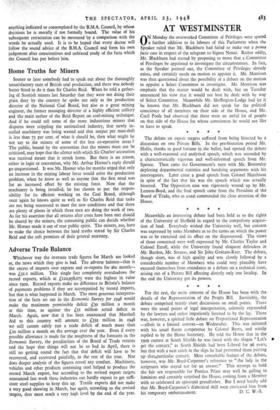AT WESTMINSTER
ON Monday the overworked Committee of Privileges were spared a further addition to its labours of this Parliament when the Speaker ruled that Mr. Blackburn had failed to make out a prima facie case in respect of the telegram to Signor Nenni. Rather oddly, Mr. Blackburn had started by proposing to move that a Committee of Privileges be appointed to investigate the circumstances. In fact, as the Speaker pointed out, the Committee of Privileges already exists, and certainly needs no motion to appoint it. Mr. Morrison was then questioned about the possibility of a debate on the motion to appoint a Select Committee to investigate. Mr. Morrison was emphatic that the matter would be dealt with, but on Tuesday announced his view that it would not best be dealt with by way of Select Committee. Meanwhile Mr. Skeffington-Lodge had let it be known that Mr. Blackburn did not speak for the political conscience of all members on their side of the House, and Mr. Cecil Poole had observed that there were an awful lot of people on that side of the House for whose consciences he would not like to have to speak.
The debate on export targets suffered from being bisected .by a discussion on two Private Bills. In the pre-bisection period Mr. Hollis, thanks to good fortune in the ballot, had opened the debate with a well-reasoned and analytical speech, which was seconded by a characteristically vigorous and well-informed speech from Mr. Spence. Then came the Government's turn with Mr. Bottomley deploying departmental statistics and bandying arguments with his interrogators. Later came a good speech from Colonel Hutchison in spite of the fact that his was the speech which was actually bisected. The Opposition case was vigorously wound up by Mr. Lennox-Boyd, and the final speech came from the President of the Board of Trade, who as usual commanded the close attention of the House.
* * * * Meanwhile an interesting debate had been held as to the rights of the University of Sheffield in regard to the compulsory acquisi- tion of land. Everybody wished the University well, but concern was expressed by some Members as to the terms on which the power was to be exercised and its effect on the dispossessed. The views of those concerned were well expressed by Mr. Charles Taylor and Colonel Erroll, while the University found eloquent defenders in Mr. Burden, Mr. Strauss, and Sir John Graham-Kerr. The debate, though short, was of high quality and was closely followed by a considerable number of Members who could very plausibly have excused themselves from attendance at a debate on a technical issue, arising out of a Private Bill affecting directly only one locality. In the end the University got its powers.
* * * * For the rest, the main concern of the House has been with the details of the Representation of the People Bill. Inevitably, the debate comprised mainly short discussions on small points. There were the usual points of legal interpretation, solemnly expounded by the lawyers and rather impatiently listened to by the lay. There was, however, a spirited little debate on Proportional Representation —albeit in a limited context—on Wednesday. This was initiated with his usual fluent competence by Colonel Byers, and wittily replied to by the Home Secretary. He told the House that in the 1929 contest at South Shields he was faced with the slogan "Let's get the century," as South Shields had been Liberal for 96 years, but that with a neat catch in the slips he had prevented them putting up that particular century. Most remarkable feature of the debate, however, was Mr. Boyd-Carpenter's reference to " the lady in the scriptures who stayed not for an answer." This attempt to hold the fair sex responsible for Pontius Pilate may well be galling to feminists and certainly surprised the House, coming from a Member with so celebrated an episcopal grandfather. But I need hardly add that Mr. Boyd-Carpenter's dialectical skill soon extricated him from


































 Previous page
Previous page